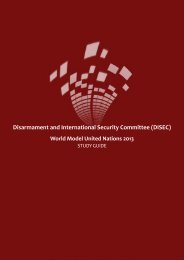Social, Humanitarian and Cultural Committee (SOCHUM)
Social, Humanitarian and Cultural Committee (SOCHUM)
Social, Humanitarian and Cultural Committee (SOCHUM)
Create successful ePaper yourself
Turn your PDF publications into a flip-book with our unique Google optimized e-Paper software.
Increased mining activity in Hell’s Gate National Park have slowly<br />
removed he Maasai of Kenya from their native l<strong>and</strong>s.<br />
<strong>and</strong> are thus left unemployed without their plot of<br />
l<strong>and</strong> to farm.<br />
disregard for indigenous l<strong>and</strong> rights can occur<br />
even when the government is attempting to act in<br />
the best interest of the community. The highl<strong>and</strong>s of<br />
northern Thail<strong>and</strong>, for example, contain significant<br />
indigenous populations, including the Akh <strong>and</strong> the<br />
Lisu, who farm rice, maize, <strong>and</strong> poppy via the slash<strong>and</strong>-burn<br />
technique, an agricultural method used in<br />
overpopulated <strong>and</strong> forested regions where there is<br />
not enough arable l<strong>and</strong>. 136 In slash-<strong>and</strong>-burn farming,<br />
agricultural plots are created through the burning<br />
<strong>and</strong> cutting of all of vegetation in a certain area.<br />
Because of the indigenous slash-<strong>and</strong>-burn methods<br />
<strong>and</strong> significant logging activity, the forests of the<br />
highl<strong>and</strong>s are severely damaged, so the Royal Forest<br />
Department, a body of the Thai government, has<br />
taken ownership of the l<strong>and</strong> <strong>and</strong> begun a replanting<br />
campaign. 137 In the process of replanting, however,<br />
the Royal Forest Department has eliminated many<br />
farms that the Akh <strong>and</strong> Lisu were cultivating. None of<br />
the indigenous peoples are Thai citizens, which makes<br />
it extremely difficult for them to retake ownership<br />
of their l<strong>and</strong> at any point. 138 Since their l<strong>and</strong>s have<br />
been taken away, they have seen increased rates of<br />
extreme poverty, HIV/AIDS, <strong>and</strong> drug addiction. 139<br />
Without access to their traditional farming practices,<br />
which produced enough food for the population to<br />
live on, many Akh <strong>and</strong> Lisu have been forced to seek<br />
other forms of income, including local wage labor <strong>and</strong><br />
jobs in the major cities of Thail<strong>and</strong>. 140 the conditions<br />
that these migrants live <strong>and</strong> work in, however, are not<br />
ideal, <strong>and</strong>, as discussed below, they face significant<br />
discrimination that makes it difficult for them to<br />
find other employment. Others have attempted to<br />
adopt sustainable agricultural practices to prevent<br />
the Thai government from taking away their l<strong>and</strong>,<br />
but since the Thai government is instituting these<br />
changes so rapidly, it is unlikely that the adoption<br />
will be successful. 141 this example illustrates the<br />
challenges that the international community faces<br />
when attempting to assist indigenous populations,<br />
as the actions that benefit them sometimes have<br />
other negative consequences, which, in this case, are<br />
environmental.<br />
Another common example of good government<br />
intentions backfiring is the development of national<br />
parks <strong>and</strong> its accompanying tourist economy on<br />
indigenous l<strong>and</strong>s. One such case concerns the<br />
Taroko, an indigenous people of Taiwan. Their<br />
territory encompasses the Taroko Gorge, a worldclass<br />
attraction that draws almost two million tourists<br />
annually. Since the founding of the Republic of China<br />
on Taiwan, the government has taken away much of<br />
their l<strong>and</strong> for development projects. The largest l<strong>and</strong><br />
grab was in 1980, when the government created the<br />
Taroko National Park. Taroko residents were forced to<br />
relocate with limited reparations <strong>and</strong> were forbidden<br />
from practicing their local customs, including hunting,<br />
fishing, <strong>and</strong> slash-<strong>and</strong>-burn agriculture. 142 Many<br />
Taroko left for jobs in the city but found themselves<br />
unemployed with the cutback in industrialization <strong>and</strong><br />
importation of foreign labor during the economic<br />
restructuring of the 1990s. Today, the government<br />
of the Republic of China is attempting to convince<br />
the Taroko to begin small businesses in the tourist<br />
36<br />
Melbourne Host Directorate PTY LTD | Office of Media <strong>and</strong> Design

















